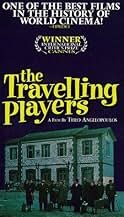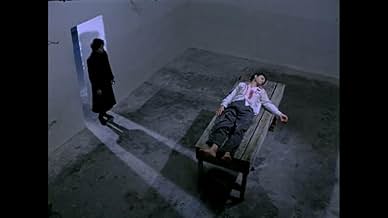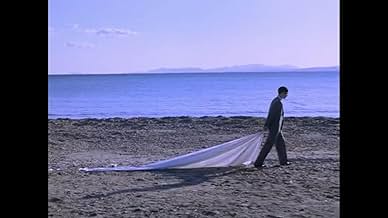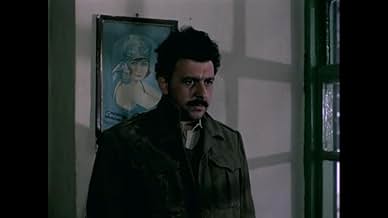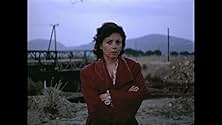IMDb RATING
7.9/10
4.5K
YOUR RATING
Greece, 1939-1952: Fascist, Nazi, and Communist conflict, as seen through the eyes of a family of travelling provincial players.Greece, 1939-1952: Fascist, Nazi, and Communist conflict, as seen through the eyes of a family of travelling provincial players.Greece, 1939-1952: Fascist, Nazi, and Communist conflict, as seen through the eyes of a family of travelling provincial players.
- Awards
- 12 wins & 2 nominations
- Director
- Writer
- All cast & crew
- Production, box office & more at IMDbPro
Storyline
Did you know
- TriviaThe whole film is accomplished in around 80 shots.
- Quotes
Elektra's Father: [before he is executed by the Germans] I came cross the sea, from Ionia. Where did you come from?
Featured review
This is my second time watching this film and it's just as great as I remember it being. In regards to Angelopoulous, the only other film I've seen from him is "Landscape in the Mist", which I also really enjoyed, but I like this one much more. "Landscape in the Mist" is definitely the more accessible of the two films since it has a greater emphasis on characterization, but while I enjoyed that film quite a bit, I prefer this film for its greater focus on its mysterious charm.
I stopped caring about the story and the characters about half an hour into this film and instead focused on the film's style. Angelopoulos seamlessly blends personal and political history in a number of hypnotic ways in just about every single sequence. And this is accomplished despite the film being almost four hours long! Throughout all the long takes in the film, Angelopoulos managed to drop my jaw a number of times. For one, he found all kinds of creative ways for the various political figures and set pieces to creep into the frame and intrude on or interrupt the characters lives. For example, the film sometimes showed the sounds of a patrol of Nazis or a political march in the distance get louder and louder until the characters eventually entered the frame. Also, sometimes when the characters would exit from the frame of a shot, it would linger in that location for a while until a soldier or a military vehicle would enter the frame, often indicating the film is jumping from past to present. This unconventional shooting style gave a hypnotic style to the film which I found quite mesmerizing and poetic.
The way violence is shown in this film is also impressive, specifically in regards to which bits are shown onscreen and which are shown offscreen. A recurring aspect to the violence was that, right when a violent bit would start, the characters would run away from the frame and the sounds of gunfire, explosions, or screaming could be heard in the distance, creating a strong sense of claustrophobia and (at times) fear of the unknown in the process. In many other cases, the violence served to prevent the actors from performing time and time again. The main highlight to the violence though is a lengthy sequence in the middle where the actors come across a gunfight between a patrol of Nazis and a group of Communists while sneaking through a town at night. The way the violence and the military units in this sequence are framed (they're only shown through the gaps between various houses and stores), in addition to a dose of surrealism, is nothing short of perfect.
Really, this film kept me glued to the screen from beginning to end in a way that few films have accomplished, and that it accomplishes this in spite of its length makes me all the more impressed by it. Some people may take issue with its lack of characterization, but I didn't mind that at all since it contributed to the film's mysterious power. Of course, I understand that many people will be intimidated by this film's length (which is understandable as I was worried it would be a chore to get through when I first watched it), but I still recommend giving it a chance anyways.
I stopped caring about the story and the characters about half an hour into this film and instead focused on the film's style. Angelopoulos seamlessly blends personal and political history in a number of hypnotic ways in just about every single sequence. And this is accomplished despite the film being almost four hours long! Throughout all the long takes in the film, Angelopoulos managed to drop my jaw a number of times. For one, he found all kinds of creative ways for the various political figures and set pieces to creep into the frame and intrude on or interrupt the characters lives. For example, the film sometimes showed the sounds of a patrol of Nazis or a political march in the distance get louder and louder until the characters eventually entered the frame. Also, sometimes when the characters would exit from the frame of a shot, it would linger in that location for a while until a soldier or a military vehicle would enter the frame, often indicating the film is jumping from past to present. This unconventional shooting style gave a hypnotic style to the film which I found quite mesmerizing and poetic.
The way violence is shown in this film is also impressive, specifically in regards to which bits are shown onscreen and which are shown offscreen. A recurring aspect to the violence was that, right when a violent bit would start, the characters would run away from the frame and the sounds of gunfire, explosions, or screaming could be heard in the distance, creating a strong sense of claustrophobia and (at times) fear of the unknown in the process. In many other cases, the violence served to prevent the actors from performing time and time again. The main highlight to the violence though is a lengthy sequence in the middle where the actors come across a gunfight between a patrol of Nazis and a group of Communists while sneaking through a town at night. The way the violence and the military units in this sequence are framed (they're only shown through the gaps between various houses and stores), in addition to a dose of surrealism, is nothing short of perfect.
Really, this film kept me glued to the screen from beginning to end in a way that few films have accomplished, and that it accomplishes this in spite of its length makes me all the more impressed by it. Some people may take issue with its lack of characterization, but I didn't mind that at all since it contributed to the film's mysterious power. Of course, I understand that many people will be intimidated by this film's length (which is understandable as I was worried it would be a chore to get through when I first watched it), but I still recommend giving it a chance anyways.
- brianberta
- May 19, 2022
- Permalink
- How long is The Travelling Players?Powered by Alexa
Details
- Release date
- Country of origin
- Languages
- Also known as
- Die Wanderschauspieler
- Filming locations
- Production company
- See more company credits at IMDbPro
Contribute to this page
Suggest an edit or add missing content

Top Gap
By what name was The Travelling Players (1975) officially released in India in English?
Answer

